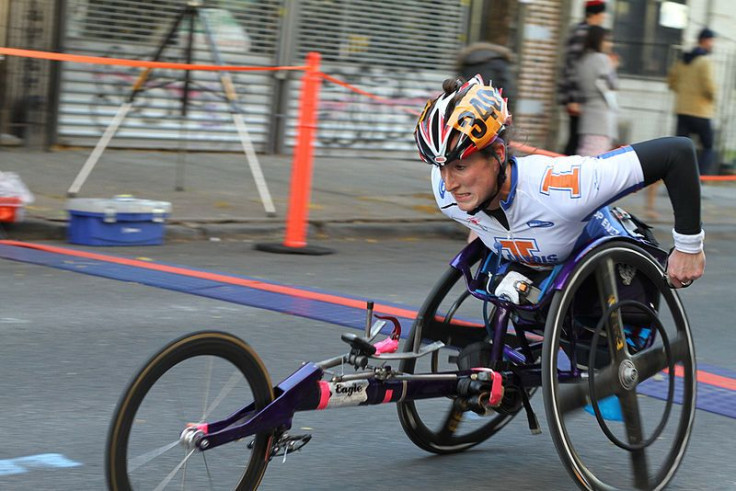Tatyana McFadden Wins NYC Marathon Wheelchair Race, First To Complete ‘Grand Slam’ Sweep

Tatyana McFadden, the 10-time American Paralympic medalist in wheelchair racing, capped off her yearlong success in winning three of the world’s largest marathons — Boston, London, and Chicago — with a win at Sunday’s New York City Marathon, making her the first athlete ever to win all four major marathons in the same year.
McFadden was born with spina bifida, a congenital birth defect caused by malformed vertebrae overlying her spinal cord. Paralyzed from the waist down and left in an impoverished orphanage, McFadden had no wheelchair growing up. For the first six years of her life, she walked on her hands — before being adopted in 1994 by the director of the International Children’s Alliance, Deborah McFadden. She has since become a world-class athlete, having competed mostly in sprinting events at the Paralympic Games and beginning her foray into marathons in 2009.
On Sunday’s race, McFadden feared the same fate would befall her as happened in 2009 and 2011, when gravelly streets punctured her tires and cost her precious seconds of lead time.
“A few times during the race, I hit a few bumps, and I was like, ‘Oh no,’” the marathoner, who finished with a near-record time of 1:59:13, told the New York Times. “I just quickly looked at my tires and saw they were still rolling.”
Wheelchair racing branches into several different categories, all depending on the athlete’s level of impairment. McFadden competes in the category T54, which is designated for people with complete mobility of their upper body, no or limited use of their torso, and no use of their lower limbs. Athletes who are more heavily paralyzed, such as those who have mobility only from their chest and arms up, compete in their own class.
Each year, about 1,500 babies are born with spina bifida, according to the Centers for Disease Control and Prevention. In 1992, the U.S. Public Health Service recommended women of childbearing age consume at least 400 micrograms of folic acid daily to reduce their risk for pregnancies complicated by neural tube defects, which include spina bifida. Subsequently, the rate of occurrence post-fortification decreased by 31 percent, from 5.04 births per 10,000 to 3.49 per 10,000.
McFadden’s case hasn’t deterred her from developing the strength necessary to her sport. For the athlete whose legs are rendered immobile, training her upper body has become all but essential to reach her current prowess and sustain her winning 4:33-per-mile pace.
“Slowly and surely, those races came,” McFadden said. “It’s just about the training and taking the time to really develop my muscles, develop the sprint aspect and develop the endurance and try to put those together.”
McFadden has plans to begin the Paralympic cross-country skiing World Cup season with an eye on making the U.S. Paralympic Team in Sochi this coming winter.
“It’s taken me a long time to get where I am,” McFadden told NBC Sports. “I didn’t just wake up, and this all happened.”
Published by Medicaldaily.com



























